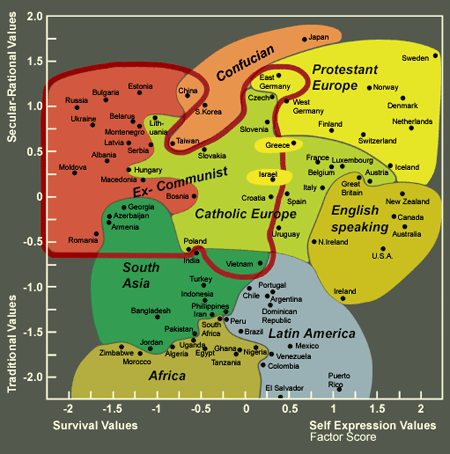Religion and wealth are the two main factors that influence cultural values around the world. The influence of religion can be measured on a scale from traditional values to secular-rational values, and the influence of wealth can be measured on a scale from survival values to self-expression values.
Traditional values are highest in Africa and Latin America, and secular-rational values are highest in Japan and Protestant Europe. Survival values are highest in Africa and ex-communist countries, and self-expression values are highest in Protestant Europe and English-speaking countries.
That’s according to the World Values Surveys, which is the largest ever cross-national survey of social change. It was conducted from 1990 to 2005, in over eighty countries spanning all six inhabited continents, by a network of social scientists at leading universities around the world.
Cultural Values Map of the World
Based on these surveys, two political scientists (Ronald Inglehart of the University of Michegan and Christian Welzel of Jacobs University Bremen) have devised this Cultural Map of the World:
Religious societies typically emphasise parent-child ties, deference to authority and traditional family values, as well as national pride. They reject divorce, abortion, euthenasia and suicide.
Wealthy societies allow young people to grow up taking survival for granted, and to focus on subjective wellbeing and quality of life, which in turn can have an influence on traditional values.
In most societies, although more slowly in Africa, cultural values have been shifting towards both secular-rational and self-expression since the first World Values Survey was conducted in 1990.
Human Constraints versus Human Choice
Here’s how Prof. Welzel analyses this trend. He says both dimensions actually measure human constraints versus human choices, on the community and personal levels. When a community has strong traditional values, it emphasises human constraints such as religion, patriotism, authority, obedience, and traditional family structures. When a person has strong self-expression values, she emphasises human choices such as freedom and self-direction, taking part in public expression, tolerating nonconformity, and trusting people.
Prof. Welzel says this shift in values is a central aspect of human development. More wealth enables younger people in particular to feel more independent in material means, intellectual skills and social connectivity. They then feel more safe and secure, and thus more able to escape from unchosen community ties. They also feel more self-directed, and thus more able to develop their creative human potentials. And all of this leads to what Prof Welzel calls postmaterialistic liberty aspirations, where people both value democracy more and are more critical of the actual performance of democracy.
Sources

Super ecixted to see more of this kind of stuff online.
The World Values Surveys link at the bottom is broken. It should be:
http://www.worldvaluessurvey.org/